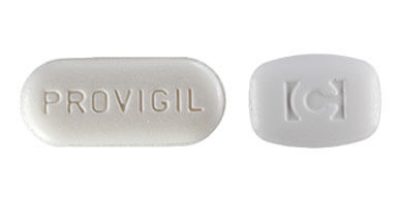Provigil and Nuvigil
Provigil (modafinil) and Nuvigil (armodafinil) are oral prescription drugs used to improve wakefulness in adults with excessive sleepiness associated with narcolepsy, obstructive sleep apnea (OSA) and shift work disorder (SWD), a sleep disorder affecting people who work overnight or nontraditional shifts.
- Medically reviewed by Ryan Rodriguez, Pharm.D., BCPS
- Last update: March 13, 2025
The U.S. Food and Drug Administration approved Provigil in 1998 and Nuvigil in 2007. Cephalon originally manufactured these medications. Teva Pharmaceutical Industries Ltd. bought the company in 2011.
The U.S. Department of Justice Drug Enforcement Administration classified the drugs’ active ingredients, modafinil and armodafinil, as Schedule IV controlled substances. This classification means they carry a low potential for abuse compared with other drugs in Schedules II and III. Modafinil and armodafinil have effects similar to stimulants such as amphetamine, but amphetamines carry a higher risk for abuse that may lead to dependence.
Because these drugs increase alertness, healthy people have used them as “smart drugs” to increase mental performance and wakefulness. For example, students have used modafinil to improve focus while studying — similar to how they use other drugs like Adderall and Ritalin. Working adults have also used them to work longer hours without sleeping. This type of use is not approved by the FDA to be included in the product labeling, and is termed “off-label” use.
“[Provigil] can be the difference between I’m just making it through the day to I had the best day of my life,” entrepreneur Dave Asprey told ABC News in 2012. Asprey had used the drug off-label, claiming it enhanced his work ability as an executive of a billion-dollar company.
The military has even used modafinil to keep soldiers and pilots alert while deployed, ABC News reported. The media has compared these drugs to the brain-enhancing drug NZT-48 featured in the 2011 movie Limitless starring Bradley Cooper.

Still, experts in 2022 warned that there are no long-term studies on the effects of these drugs on a healthy brain. The American Academy of Sleep Medicine has warned that Provigil should be used only under a doctor’s supervision for the treatment of excessive sleepiness caused by shift work disorder, narcolepsy or obstructive sleep apnea.
“Provigil should not be prescribed off-label or purchased independently by consumers for cognitive or performance enhancement,” according to the professional society. “There is little evidence to support the use of Provigil or any other drug to improve learning and memory, and no medication provides such benefits without side effects.”
How Modafinil and Armodafinil Increase Wakefulness
Researchers admit that they don’t know exactly how Provigil and Nuvigil work to increase wakefulness. Scientists think modafinil increases histamine levels, which can make people feel more awake. It also stimulates other neurotransmitters in the brain, including dopamine, a chemical which affects mood.
According to the drugs’ labels, both medications reach maximum concentration in the blood in about two to four hours. Food doesn’t have an effect on the drugs, but it may take longer for the drugs to take effect if they are taken with food. Asprey told ABC News it took about 17 minutes for him to feel the effects.
In clinical trials of modafinil and armodafinil, patients reported improvements in scores measuring excessive sleepiness and maintaining wakefulness. Unlike amphetamine, modafinil and armodafinil generally do not cause severe crashes or withdrawals.
Provigil vs Nuvigil
Although Provigil and Nuvigil work in the same way, they come in different dosages and have different chemical makeups and side effects.
The advantage of Nuvigil is the flexibility of strengths available. It allows people to start at lower doses and go up to higher doses over time if needed.
A study by M. Darwish and colleagues published in 2009 in Clinical Drug Investigation found that Nuvigil blood concentrations were higher than Provigil late in the day. The authors said it may mean improved wakefulness throughout the day with Nuvigil.
| Brand Name | Provigil | Nuvigil |
| Active Ingredient/Generic Name | modafinil | armodafinil |
| Inactive ingredients | lactose monohydrate, microcrystalline cellulose, pregelatinized starch, croscarmellose sodium, povidone, and magnesium stearate | lactose monohydrate, microcrystalline cellulose, pregelatinized starch, croscarmellose sodium, povidone, and magnesium stearate |
| FDA-Approved Uses | Improve wakefulness in adults with narcolepsy, obstructive sleep apnea or shift work disorder | Improve wakefulness in adults with narcolepsy, obstructive sleep apnea or shift work disorder |
| How is the drug taken? | Oral tablet | Oral tablet |
| Strengths | 100 mg and 200 mg | 50 mg, 150 mg, 200 mg, 250 mg |
| Average retail price according to Good Rx | $697.73 for 30 tablets at 200 mg | $498.85 for 30 tablets at 250 mg |
| Half-life | 15 hours | 15 hours |
| Controlled substance | Yes, Schedule IV | Yes, Schedule IV |
| Top four side effects | Headache, nausea, nervousness and rhinitis | Headache, nausea, dizziness, and insomnia |
Provigil vs Adderall
Although modafinil and armodafinil have wakefulness effects similar to the stimulants amphetamine and methylphenidate, the FDA approved the drugs for different uses.
Stimulants such as Adderall (amphetamine), Ritalin (methylphenidate), and Concerta (methylphenidate) are used to treat attention deficit hyperactivity disorder (ADHD) in patients as young as 6 years old. Provigil and Nuvigil are approved only for adults with certain sleep disorders.
Also, studies have found modafinil has fewer side effects than amphetamine. For example, Provigil is less habit-forming, has no reports of withdrawal symptoms, and has milder side effects than Adderall.
Adderall is a Schedule II substance, not a Schedule IV substance like Provigil. This means there is a greater risk for abuse with Adderall. Adderall can also cause sexual side effects and withdrawal symptoms.
Safety Concerns
While reports of side effects with Provigil and Nuvigil are generally few, drug labels warn that the medications can rarely cause serious side effects. These include: a serious rash called Stevens-Johnson Syndrome, allergic reactions, persistent sleepiness, psychiatric symptoms and in people with cardiovascular disease, effects such as palpitations or increased blood pressure.
Common side effects of these drugs include headaches, nausea and diarrhea. The most commonly reported side effect in clinical trials was headache.
There are also concerns about drug interactions and how the drugs affect unborn babies.
Drug Interactions
Drug interactions can occur when modafinil and armodafinil are taken with other drugs. These interactions may result in other drugs influencing the effectiveness and side effects of modafinil and armodafinil, and similarly, modafinil and armodafinil can influence the effectiveness and side effects of other drugs.
- Steroidal contraceptives (effectiveness may be reduced)
- Cyclosporine (blood levels may be reduced)
- Prilosec (omeprazole; blood levels may be increased)
- Phenytoin (blood levels may be increased)
- Diazepam (blood levels may be increased)
This isn’t a complete list, so make sure you let your doctor and pharmacist know of all drugs, vitamins and herbal supplements you take.
Women of childbearing age should tell their doctor immediately if they use any form of hormonal birth control. This includes patches, pills, intrauterine devices (IUDs), implants, vaginal rings or shots. Your birth control may not work while you take Provigil or Nuvigil and for up to one month after you stop taking the drugs.
The drugs’ labels also discourage patients from using alcohol while taking the medications.
Pregnancy Warnings and Risk of Birth Defects
Drug labels in the United States say there are not enough studies to determine whether it’s safe to take Provigil or Nuvigil during pregnancy, and they say it’s unknown whether these drugs pass into mothers’ breast milk.
During animal studies, these drugs were associated with growth restriction, spontaneous abortions and other toxic effects in fetuses. As a result, the FDA asked the manufacturer to set up a pregnancy registry to track side effects. FDA-approved drug labels warn that these drugs should only be used in pregnant women if the benefits outweigh the risks. Doctors may encourage their patients to enroll in registries for pregnant women taking modafinil and armodafinil to evaluate their effects in these patients.
Data gathered from the pregnancy registry led Teva Pharmaceuticals Ireland to release a warning on June 7, 2019, saying use of modafinil during pregnancy is suspected to cause congenital malformations.
Then, on June 20, 2019, Health Canada sent a warning to health care professionals about modafinil and the risk of congenital anomalies. Although these new findings have not led to a change in the labeling of the FDA-approved products, these alerts from Ireland and Canada suggested that modafinil should not be used in women who are pregnant or may become pregnant.
Lawyers in the United States are actively pursuing Provigil and Nuvigil lawsuits involving birth defects in children whose mothers took the drugs during pregnancy.
Taking Provigil or Nuvigil Safely
Modafinil and armodafinil come in pill form and are taken orally. Patients can take their dose with or without food.
Your doctor will prescribe the dose that is right for your situation. He or she may prescribe one dose and increase it slowly or decrease it depending on effectiveness and side effects. Take the medication exactly as prescribed, and do not make changes to your dose without first consulting your doctor.
| Indication | Provigil | Nuvigil |
|---|---|---|
| Narcolepsy or obstructive sleep apnea | 200 mg once a day in the morning | 150 mg to 250 mg once a day in the morning |
| Shift work disorder | 200 mg once a day about one hour before start of shift | 150 mg once a day about one hour before start of shift |
| Patients with severe hepatic impairment | Reduced to one-half the recommended dose | Reduced dose |
| Geriatric patients | Consider lower doses and close monitoring | Consider lower doses and close monitoring |
Ask your doctor what time of day is best to take your medication. Taking the drug too close to when you go to bed can make it harder to fall asleep.
Generally, people with obstructive sleep apnea or narcolepsy take their dose in the morning. People with shift work disorder typically take the medicine about an hour before they have to start work.
Be careful about doing things that could be dangerous. Until you can gauge how the medication affects you, don’t drive or do other risky activities. You shouldn’t modify your routine until your doctor says you can.
Overdose
People have reported fatal overdoses involving modafinil alone or involving armodafinil or modafinil in combination with other drugs.
The most common symptoms of a Nuvigil or Provigil overdose include:
- shortness of breath
- trouble sleeping
- central nervous system symptoms such as hallucinating or feeling confused, disoriented, excited, agitated or restless
- digestive changes such as diarrhea and nausea
- cardiovascular changes such as chest pain, high blood pressure, or fast or slow heart rate
There is no antidote for an overdose. Seek help immediately if you suspect an overdose.
Calling this number connects you with a Drugwatch.com representative. We will direct you to one of our trusted legal partners for a free case review.
Drugwatch.com's trusted legal partners support the organization's mission to keep people safe from dangerous drugs and medical devices. For more information, visit our partners page.


